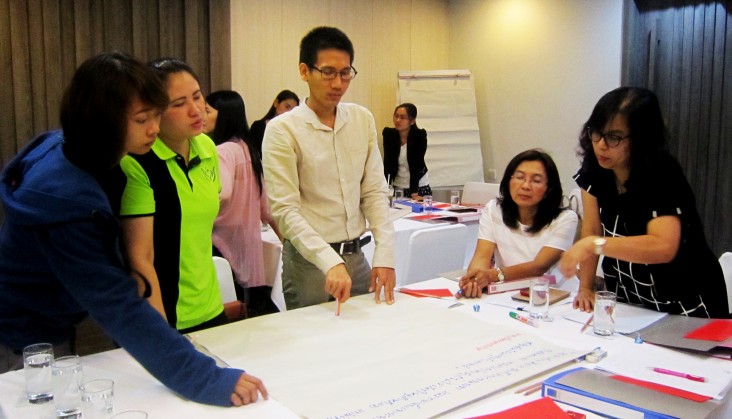Speeches Shim

February 2018 — Sirichai* is a construction worker who lives with his wife in Thailand’s Rayong province. In 2013, he was diagnosed with tuberculosis (TB) and has undergone multiple courses of treatment since then. At the age of 50, he learned that he had severely drug-resistant tuberculosis, and doctors recommended an operation to remove part of his lung.
That same day, Sirichai left the hospital with no plans to return or to have the procedure.
Rather than giving up on Sirichai, his health care team visited him at home to use their proactive approach and discuss his concerns. Sirichai worried about the long trip to the hospital for the lung surgery, and he wondered about who would take care of him afterwards.
“So, when will I be picked up tomorrow? What preparations do I have to do?” asked Sirichai. “I want my son to come with me.”
The team explained the support they could offer, including transportation to the hospital, care during his in-patient stay, and care after he returned home. With his concerns addressed, Sirichai decided to proceed with the operation.
“We gave him time to think and reflect, and the right to make the decision by himself. We only provided enough information so he could decide,” said Preeyapat Intrasub, provincial TB coordinator of the Rayong Provincial Health Office.
Sirichai continues his medicinal treatment and has been responding well. He returned to his construction job, and his health care team is confident that he will successfully complete treatment.
This is one example of the power of interviewing called Motiv8, which inspires patients to change their behavior based on internal motivation rather than external directive.
USAID’s Control and Prevention of Tuberculosis (CAP-TB) project has trained 26 health care providers in Thailand to use the motivational interviewing technique. Since 2015, these providers have been using Motiv8 to promote treatment adherence among TB and drug-resistant TB patients, and the novel approach is spreading in Rayong province.
Motivational interviewing challenges the typical patient-provider relationship where patients are simply expected to comply with providers’ recommendations. With this new approach, the patient and provider are partners in the decision-making process. When TB patients are engaged in this way, those who are ambivalent or resistant to treatment move toward getting the care they need and are more likely to be cured.
“I'm accepted by the patient and they open up to me more,” said a health care provider in Rayong following the Motiv8 training. “Before we knew Motiv8, we only gave information that we want to give to the patient. We rarely listened to the knowledge that they already had, how they think and feel, or what problems they faced.”
Proven effectiveness has led to Motiv8’s use with HIV and TB-HIV coinfected patients, both with and without USAID support. Given its success, continued scale-up of this approach could lead to better treatment adherence and improved outcomes in Asia and beyond.
Motiv8 is only one part of the broader USAID CAP-TB patient-centered approach being implemented in countries throughout Asia. The project, which runs from October 2011 through October 2018, has introduced successful patient-centered treatment programs for multidrug-resistant tuberculosis patients in China, Myanmar and Thailand. Tailored for each location, the project delivers consistently higher patient adherence and treatment success rates by focusing on the patient’s requirements, not just the challenging clinical regimens.
*Name changed to protect privacy.
LINKS
Follow @USAIDAsia, on Facebook, on YouTube

Comment
Make a general inquiry or suggest an improvement.